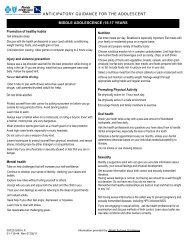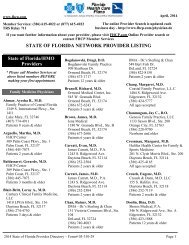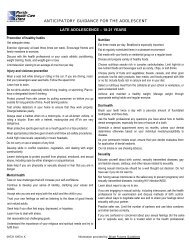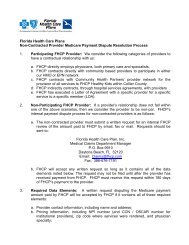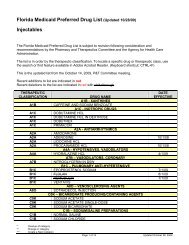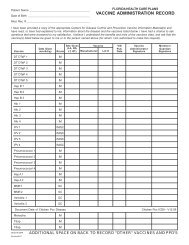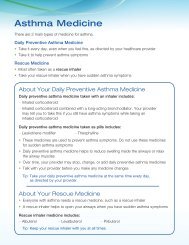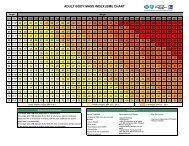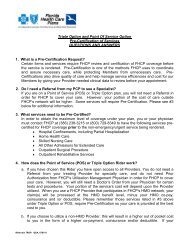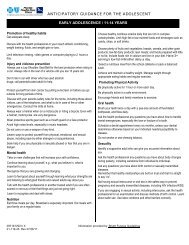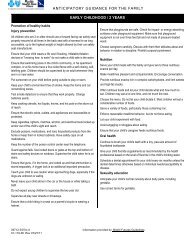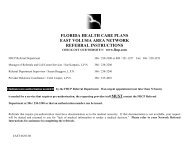MEMORANDUM - Florida Health Care Plans
MEMORANDUM - Florida Health Care Plans
MEMORANDUM - Florida Health Care Plans
Create successful ePaper yourself
Turn your PDF publications into a flip-book with our unique Google optimized e-Paper software.
<strong>MEMORANDUM</strong><br />
TO:<br />
Primary <strong>Care</strong> Physicians<br />
FROM:<br />
Tyler Staley, MD<br />
RE:<br />
Concussion Information<br />
DATE: October 31, 2012<br />
Dear Colleagues,<br />
The management of patients with concussions, especially athletes, is constantly evolving.<br />
Information to assist you in managing such cases is available; please see the attached Concussion<br />
Information Sheet created by the Volusia/Flagler County Concussion Task Force. If you feel<br />
comfortable managing these patients yourself, please follow the instructions listed in the handout,<br />
including Form AT-18 which must be signed by the physician and the athletic trainer performing<br />
the return to play protocol.<br />
However, if you would prefer to refer such cases, I am happy to accept them for further evaluation<br />
and treatment. If I cannot be reached or I am unable to see the patient at the desired date and<br />
time, Dr. Wes Driggers is also available to see patients with a concussion. Please try to provide<br />
the patient with the Concussion Information Sheet, which provides additional information and<br />
instructions for patients until they can be seen. If you have questions about a patient you are<br />
seeing in this regard, please do not hesitate to contact me.<br />
Sincerely,<br />
Tyler Staley, MD<br />
Sports Medicine<br />
<strong>Florida</strong> <strong>Health</strong> <strong>Care</strong> <strong>Plans</strong><br />
330 N Clyde Morris Blvd<br />
Daytona Beach, FL 32114<br />
386-238-3290<br />
Attachment: Concussion
VOLUSIA FLAGLER<br />
Concussion<br />
TASK FORCE<br />
Dear Provider:<br />
John Shelton, MD<br />
Center for Family and Sports Medicine<br />
386.254.4165<br />
Trish Ramsay<br />
Center for Family and Sports Medicine<br />
386.254.4165<br />
Miguel Concepcion, MD<br />
Center for Family and Sports Medicine<br />
386.254.4165<br />
Brent Fulton, MD<br />
Medical Exercise Associates<br />
386.258.9502<br />
Katarzyna Madejczyk, MD<br />
Halifax <strong>Health</strong> Emergency Department<br />
Michael Fabian, MD<br />
Halifax <strong>Health</strong><br />
John Hill, MD<br />
West Volusia Family and Sports Medicine<br />
386.774.0016<br />
John McFarland, MS, ATC, LAT<br />
CORA <strong>Health</strong><br />
386.871.7818<br />
James Piotrowski, PA-C, MS<br />
Neurology & Spine, LLC<br />
386.763.4484<br />
Jeremy Grimes, MD<br />
Neurology & Spine, LLC<br />
386.763.4484<br />
Robert Sefcik, ATC, LAT<br />
Jacksonville Sports Medicine Program<br />
904.202.4332<br />
Kim Csabi, MESS, ATC, LAT<br />
Daytona State College<br />
386.506.3989<br />
Lary Beal<br />
Volusia County Schools<br />
386.734.7190<br />
Gary Marks<br />
Volusia County Schools3<br />
386.734.7190<br />
Jaime Pinyan<br />
Volusia County Schools<br />
386.235.1722<br />
Staci Hahn<br />
Volusia County Schools<br />
386.968.0013<br />
Beth Hooks<br />
<strong>Florida</strong> Hospital<br />
Dawn Emerick, CEO<br />
<strong>Health</strong> Planning Council NE <strong>Florida</strong><br />
Joyce Case<br />
<strong>Health</strong> Planning Council of NE <strong>Florida</strong><br />
386.323.2046<br />
Effective July 1, Chapter 458 and 459, <strong>Florida</strong> Statutes outlines specific steps for<br />
return to play (RTP) following a concussion in sports.<br />
This 2012 law requires an athlete with a suspected concussion to be immediately<br />
removed from participation and directed to a physician (MD or DO), for evaluation<br />
and management of this injury. No student athlete should return to play on the<br />
same day.<br />
Return to activity requires:<br />
1. The athlete to be completely symptom free and off all medications<br />
associated with this concussive incident<br />
2. The athlete to have a normal neurological exam<br />
3. All pre-season computer neuropsychological testing, if available, must be<br />
returned to baseline<br />
4. Once the athlete is free of symptoms, the physician is directed to follow the<br />
instructions on Form AT 18<br />
5. A signature is required to initiate RTP. A second signature is required to<br />
return the athlete to competition once graded RTP is complete with no symptoms<br />
Form AT18 is attached for your convenience. Additional copies may be obtained<br />
from the available at Northeast <strong>Florida</strong> Counts website www.nefloridacounts.org<br />
Initiative Center under ’quick links.’<br />
For current and up to date information on concussions, visit:<br />
http://www.cdc.gov/concussioninyouthsports/<br />
http://www.seingstarsfoundation.org<br />
http://www.fhsaa.org/forms/general-athletic/at18<br />
Sincerely yours,<br />
Volusia/Flagler Concussion Task Force
VOLUSIAFLAGLER<br />
CONCUSSION<br />
TASK FORCE<br />
C oncussion Information Sheet<br />
Parent / <strong>Care</strong>giver:<br />
Your student athlete was removed from sports activity today after sustaining an injury to his/her head.<br />
____________ ____________________________________________________ _________________________<br />
DATE LOCATION TIME<br />
Concussion (Definition/Description): A concussion is a serious injury to the brain resulting in a<br />
disturbance of brain function. By definition, a concussion is an injury to the brain that can cause both<br />
short‐term and long‐term problems. Below are signs and symptoms your student athlete may experience<br />
after sustaining a concussion.<br />
Concussion Symptom Checklist (not meant to be all‐inclusive)<br />
☐Headache ☐Feeling Foggy ☐Irritable Behavior ☐Change in sleep patterns<br />
☐Nausea/Vomiting ☐Sensitive to light ☐Clumsy ☐Balance Problems<br />
☐Sensitive to noise ☐Ringing in Ears ☐Change in personality ☐Dizziness<br />
☐Slurred speech ☐Slow to answer ☐Loss of Consciousness ☐_________________<br />
☐Blurry/Double Vision ☐Memory problems ☐Stiffness in neck ☐_________________<br />
☐Confusion<br />
☐_________________<br />
________________________________________ ______________________________________<br />
Evaluated by (Please print) Phone Number<br />
Treatment and Recovery<br />
What are your next steps?<br />
Within the next 24‐48 hours, make sure your student athlete rests, and drinks plenty of fluids (water and<br />
sports drinks). If needed provide pain relievers (i.e. acetaminophen) that have previously been tolerated.<br />
If, after 48 hours, the student athlete is asymptomatic then proceed with doctor visit.<br />
*** IF THE STUDENT ATHLETE BEGINS TO FEEL WORSE OR HAS IN INCREASED INTENSITY<br />
OF SYMPTOMS – THIS IS AN INDICATION THAT YOU MUST IMMEDIATELY TAKE HIM/HER<br />
TO THE NEAREST EMERGENCY ROOM FOR FURTHER EVALUATION.***<br />
The purpose of this evaluation is to discover if some other injury may exist or if the brain is not healing<br />
from the injury. If no other injuries are found the evaluating physician may prescribe additional care<br />
measures to help reduce your student athlete’s discomfort.<br />
Please note: Normal brain and skull imaging studies (CT scans, MRI’s) by themselves do not rule<br />
out a concussion or predict a safe return to physical activity.
VOLUSIAFLAGLER<br />
CONCUSSION<br />
TASK FORCE<br />
If you do not visit the emergency room, follow these suggestions:<br />
1. Arrange a visit with your family physician or other healthcare professional that has been trained<br />
in the evaluation and management of concussion. Share with him/her this injury evaluation you<br />
received. Bring this Concussion Information Sheet with you to the doctor’s visit.<br />
2. Allow your student athlete to rest in a quiet area. It is recommended that you eliminate most<br />
external brain stimuli including bright lights, loud noises, TV, computers, reading, video gaming<br />
texting, etc… Limit visitors so as not to overstimulate the healing student athlete.<br />
3 Notify your student athlete’s school of the injury; it is possible that educational modifications will<br />
be needed to assist your student athlete during healing. Please discuss with your family physician<br />
for more information. Likewise, it may be necessary to delay the student athlete’s return to an<br />
after‐school or weekend job until it is deemed safe to perform these activities.<br />
4. No form of athletic activity should be resumed prior to formal clearance by your physician.<br />
Sleeping<br />
It is typical for a student athlete who has suffered a concussion to become tired and lethargic. It is<br />
acceptable for your student athlete to sleep. However, excessive sleepiness and lethargy would be cause<br />
to seek further evaluation from a medical doctor.<br />
Return to Play (RTP) Criteria/Concussion Management<br />
Concussion, like other injuries, requires a rest/recovery period so that the brain has time to heal. Healing<br />
is an individual process, so no specific time frame can be given. <strong>Florida</strong> State Statute HB 291 requires that<br />
a student athlete is evaluated by a physician (MD or DO) prior to any return to play. The FHSAA<br />
concussion action plan listed below is the accepted process of return to play safely after a concussion.<br />
1. No student athlete should return to play or practice on the same day of a suspected concussion.<br />
“When in doubt, sit them out!”<br />
2. Any student athlete suspected of having a concussion must be evaluated by an appropriate<br />
healthcare professional as soon as possible and practical.<br />
3. Any student athlete who has sustained a concussion must be medically cleared by a physician (MD<br />
or DO) prior to resuming participation in any practice or competition.<br />
4. After evaluation and examination, return to play must follow a step‐wise protocol as defined by<br />
the graded Return to Play protocol form and under the supervision of a physician, athletic trainer,<br />
coach, or other healthcare professional. Form AT 18 (Post Head Injury/Concussion)<br />
5. A written medical clearance from a physician is required for return to competition.<br />
For current and up‐to‐date information on concussions, visit www.cdc.gov/concussioninyouthsports/<br />
PLEASE TAKE THIS FORM WITH YOU TO YOUR PHYSICIAN VISIT SO HE/SHE IS AWARE OF WHAT<br />
HAS HAPPENED




